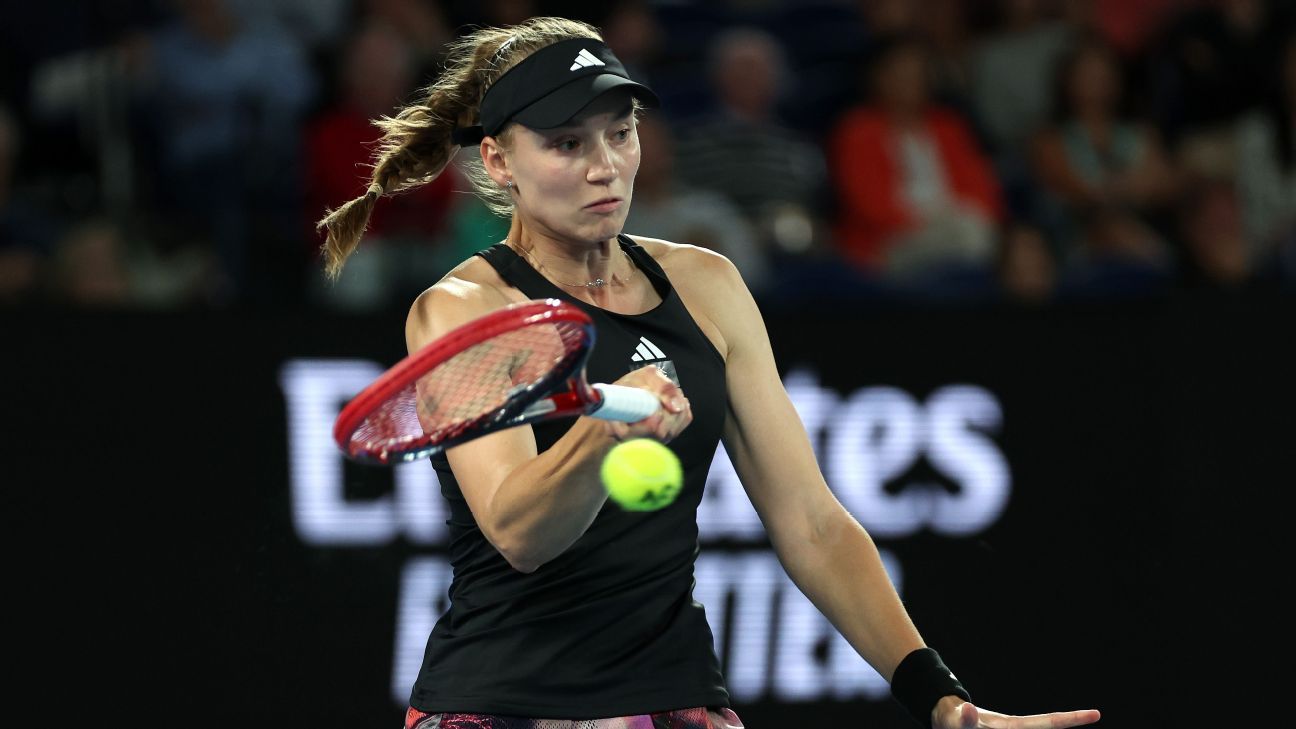Products You May Like
MELBOURNE, Australia — Wimbledon champion Elena Rybakina reached her second final in the past three Grand Slam tournaments by beating Victoria Azarenka 7-6 (4), 6-3 at the Australian Open on Thursday.
Rybakina added to what already was an impressive run through a string of top opponents. Azarenka, the champion at Melbourne Park in 2012 and 2013, joined a list of players eliminated by Rybakina over the past two weeks that includes No. 1 Iga Swiatek and No. 17 Jelena Ostapenko — both owners of major titles — and 2022 Australian Open runner-up Danielle Collins.
As usual, Rybakina did it with her powerful serve, delivering it at up to 117 mph and accumulating nine aces to bring her total to a tournament-high 44, and stinging groundstrokes that she used to close points seemingly at will. The performance was particularly noteworthy against a returner and defender as established on hard courts as Azarenka, a former No. 1 and a three-time runner-up at the US Open.
In Saturday’s final, Rybakina will take on either No. 5 Aryna Sabalenka of Belarus or unseeded Magda Linette of Poland. Sabalenka took a 9-0 mark in 2023 into Thursday’s second semifinal, while Linette made it to that stage of a Grand Slam tournament for the first time in 30 appearances.
“For sure, I got a lot of experience from Wimbledon, and to be honest, I just want to come on court and really enjoy the moment, enjoy the atmosphere,” Rybakina said, looking ahead to Saturday.
Rybakina is 23, 10 years younger than Azarenka, and the future sure looks bright at the moment.
She might be seeded 22nd in Melbourne, and ranked 25th, but those numbers are not indicative of her talent and form. Rybakina did not get the usual bump from her title in July at Wimbledon, where zero rankings points were awarded after the All England Club banned players from Russia and Belarus because of the invasion of Ukraine.
Rybakina was born in Moscow, but she has represented Kazakhstan since 2018, when that country offered to fund her tennis career.
It was breezy and chilly at Rod Laver Arena from the start of Rybakina vs. Azarenka, with the temperature dipping below 70 degrees Fahrenheit. That could have played a role in the way the first set was as much of a seesaw as can be, with each player seeming to gain the upper hand and ceding it just as quickly.
“I couldn’t play really aggressive tennis,” Rybakina said. “The ball wasn’t going so much.”
Rybakina’s occasional inconsistency was encapsulated by the first game. She began, inauspiciously, with a double-fault before holding with the help of three aces.
Azarenka nosed ahead by breaking for a 3-2 lead on a leaping, full-extension volley winner with both women at the net. Rybakina, though, broke right back and then once more to go up 5-3.
That allowed Rybakina to serve for the set, and she was a point from owning it at 40-30, but Azarenka conjured up a terrific down-the-line forehand passing shot to erase that chance and wound up taking the game with a big backhand winner she accented with a shout of “Let’s go!”
A mistake-filled tiebreaker ended with Azarenka pushing a forehand wide to cap an 11-shot exchange. Rybakina broke at love for a 2-1 lead in the second, and while they would continue to play for another 25 minutes, the outcome was never really much in doubt.
Sure, Rybakina again faltered while trying to serve out the victory at 5-2. No one expected Azarenka to go quietly. But one last break, aided by a double-fault from Azarenka, allowed Rybakina to take another step toward another trophy.
Billie Jean King and six other members of the trailblazing “Original 9” group of Hall of Famers whose $1 contracts more than a half-century ago paved the way for the millions now offered in women’s tennis were in the stands for the semifinals.
“I want to say a big ’thank you’ from the players, because it’s unbelievable what you’ve done for us, for the new generation,” Rybakina said. “It means a lot.”
